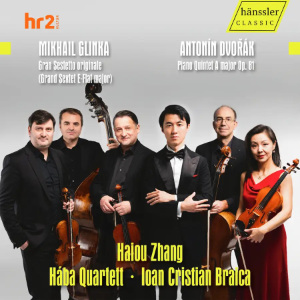
Antonín Dvořák (1841-1904)
Piano Quintet in A major (No. 2), Op. 81, B.155 (1887)
Mikhail Glinka (1804-1857)
Grand Sextet in E flat major (1832)
Hába Quartett
Haiou Zhang (piano), Ioan Cristian Braica (double bass)
rec. 2022, hr-Sendesaal, Frankfurt am Main, Germany
Hänssler Classic HC24034 [65]
The performers of these two Romantic chamber works Dvořák are the Hába Quartet with impressive contributions from pianist Haiou Zhang in both works and double bass player Ioan Cristian Braica in the Glinka Sextet.
Founded in Prague in 1946 by violinist Dušan Pandula, the Hába Quartet focused on contemporary music notably by Moravia born pedagogue Alois Hába a microtonal composer from whom the quartet takes its name. In 1968, the Hába Quartet broke up, but in 1984 Pandula reformed the quartet, now based in Frankfurt, using the same name and maintaining the well-established tradition of the original quartet.
In 1872, Dvořák composed a three movement Piano Quintet in A major, B.28, Op. 5. It was premiered in 1872 but the original version of the score went missing. Some fifteen years later, wishing to revise some of his old scores, Dvořák managed to obtain a copy of the score and made revisions. The revised version was eventually premiered some eighteen years after his death. Buoyed by the success of his fifth visit to England in 1886, the next year Dvořák completed his substantial and joyous four movement Piano Quintet in A major (No. 2), B.155, Op. 81. Written before Dvořák’s extended stay in the USA and premiered in 1888 in Prague, the score was composed in the Slavic folk idiom that pervades so many of his best scores.
It is a great work, loaded with melodies. Pianist Haiou Zhang and the Hába Quartet providing a stylish and insightful performance and seem to revel in the lyrical writing. The slow movement the Dumka marked Andante con moto, with its lovely main theme, is played with charm and warmth. In the quicker movements, the players excel, their unerring spirit and ebullience driving the music along. Most enjoyable is the Allegro – Finale, which is both edgy and uplifting by turns.
For recordings of the Piano Quintet in A major (No. 2) I have always reached for the evergreen 1962 Vienna account from pianist Clifford Curzon and the Vienna Philharmonic String Quartet led by Willi Boskovsky.; it is classic chamber music playing of the highest quality, available digitally remastered on Decca (c/w Schubert Trout Quintet, D.667). This new recording is one of the finest modern accounts and provides strong competition to that Curzon/VPO version.
Glinka is best remembered today for his two seminal Russian operas A Life for the Tsar (1836) and Ruslan and Ludmilla (1842). He did write a handful of chamber works and in 1832 completed his Grand Sextet (Gran Sestetto originale) in E-flat major scored for two violins, viola, cello, bass and piano. While living in Milan, Glinka came under the influence of Italian opera especially that by Donizetti and when writing his Grand Sextet he was captivated by a young Italian woman, the married daughter of his doctor Filippo De Filippi. She was a talented amateur pianist and Glinka had it in mind to dedicate the work to her. Containing a substantial virtuoso part for the piano, the Grand Sextet is rather like a concerto. It was some fifty years before it was published in Moscow in 1881.
It is is a striking three movement score, like Dvořák’s Piano Quintet (No. 2) written over fifty years later, crammed with memorable melodies. A highlight is the serenade-like, central movement Andante afforded meltingly beautiful playing with an undertone of brooding melancholy. A central section has a lovely part for two violins, sometimes described as gypsy inspired. Without a break, the Allegro con spirito – Finale surges forward. Glinka then writes an impressively spirited polacca. All in all, the result is an unfailingly buoyant performance.
The quality of the recorded sound here is satisfying clear and well balanced. The booklet notes provided with the CD are certainly adequate, although I really wanted additional information on each work.
Another option is a praiseworthy 2003 recording of the Grand Sextet by the Borodin Quartet joined by pianist Ludmila Berlinskaya and double bass player Grigori Kovalevski on EA Records, which I favourably reviewed in 2005, but I see no need to switch affiliation to other recordings of these two works, as I am happy to stick with this Hänssler Classic recording.
Michael Cookson
Buying this recording via a link below generates revenue for MWI, which helps the site remain free




















